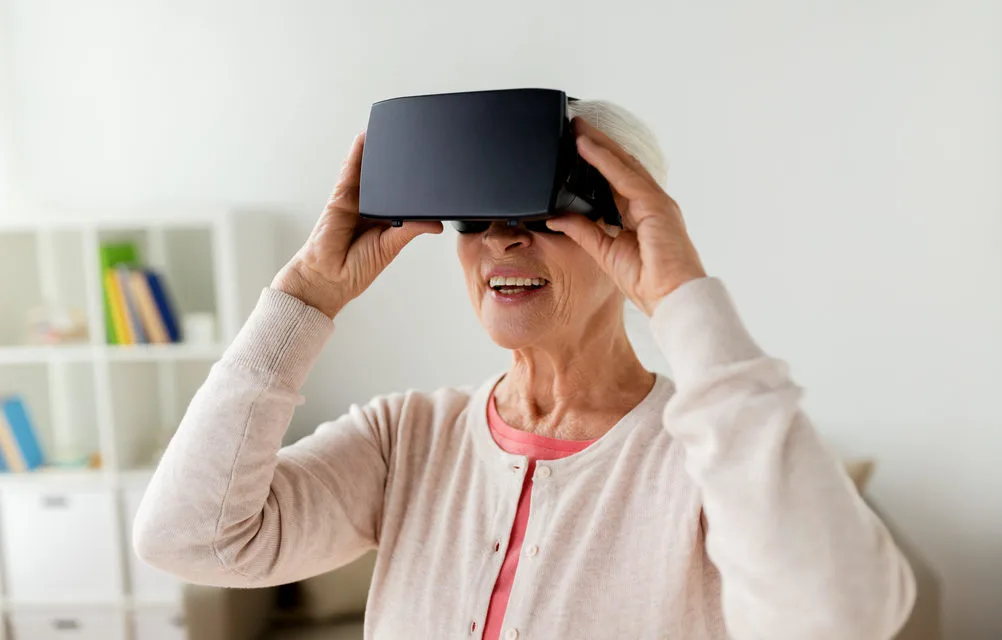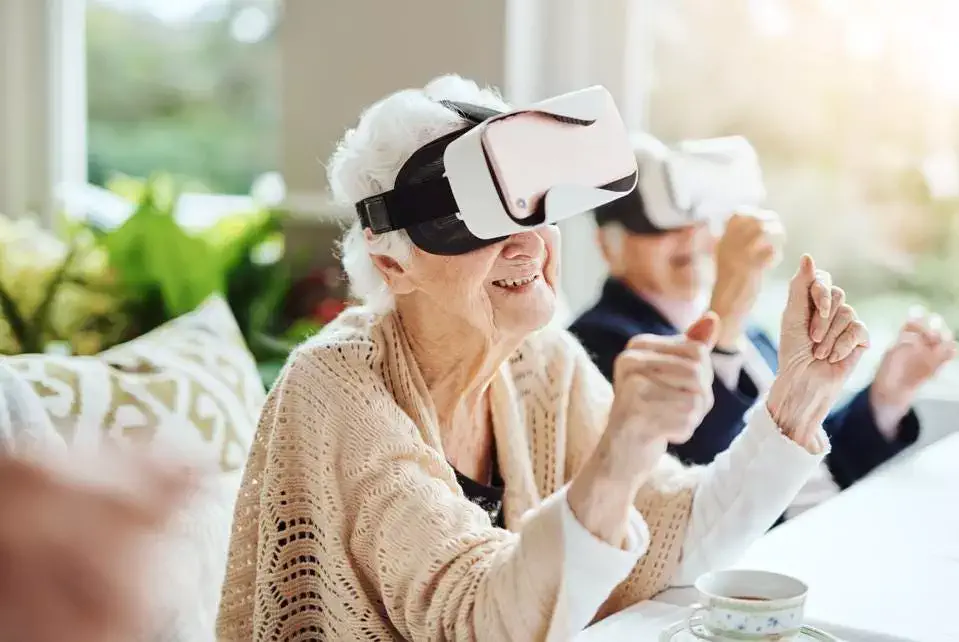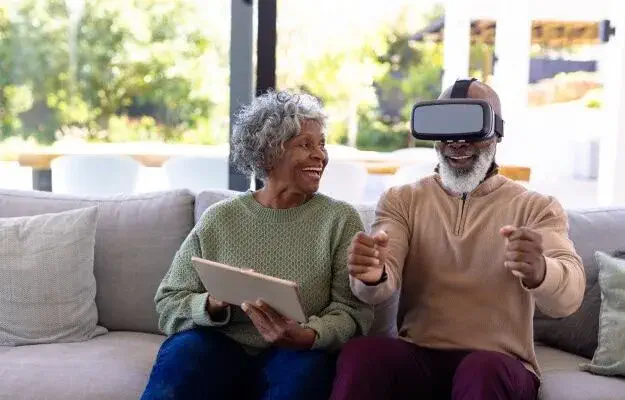
Virtual Reality for Elderly: 5 Best VR App for Seniors
For the elderly and those forced into isolation from the world, whether due to the COVID-19 pandemic or as a result of age-related illnesses and mobility issues, virtual reality for elderly has become one of the most important solutions. Seniors can practice activities they were previously unable to do, in addition to facilitating communication with others.
Studies show that loneliness and isolation can lead to numerous harms, while social engagement and cognitive stimulation can delay or prevent the onset of dementia. Therefore, exacerbating this loneliness, especially in old age, is considered a serious public health risk. In order to reduce loneliness and isolation among the elderly, numerous applications have been developed, virtual reality for elderly being one of them.
By using virtual reality headsets and connecting them to a smartphone, individuals can participate in a simulated full-life experience with various activities, which rejuvenates their activity and increases their desire for these activities and a return to normal life. In this article from humanhealthmag, we Introducing virtual reality to older adults, best VR applications for seniors, and benefits of virtual reality for elderly.
Virtual Reality Among the Elderly
Studies have shown that virtual reality technology can have a positive impact on the memory of elderly people with mild cognitive impairment (MCI). As we know, aging is associated with biological, physiological, psychological, behavioral, and social changes. These changes include a decline in cognitive function. Mild cognitive impairment (MCI) is one of the disorders associated with impaired cognitive function. MCI is an intermediate stage between normal age-related cognitive changes and early dementia.

Researchers in a study examined the feasibility and impact of a cognitive rehabilitation program using virtual reality for elderly on improving working, visual, and verbal memory in them. The study found that while cognitive rehabilitation approaches have had limited success for progressive disorders, virtual reality (VR) technologies designed to provide practical exercises for the elderly can be valuable.
VR technologies that utilize preserved procedural learning ability in a relatively safe environment can help maintain the performance of daily living activities needed to maintain safe and independent living. In designing the program’s content, efforts were made to make the exercises in the form of activities that elderly people deal with on a daily basis, such as shopping, taking medication, and placing objects in their place.
Then, this program was written as a VR program by the programmer and under the supervision of the research team using Unity software, and using the relevant hardware and software, it was converted into an executable VR program. This program was designed in 10 training sessions, the main goal of which was to improve working memory.
Based on the results of this study, a cognitive rehabilitation program using virtual reality technology can be effective in improving the working memory of elderly people with MCI, and its durability also exists in verbal working memory for up to one month after treatment.
How can the elderly use virtual reality?
Entering the world of virtual reality does not require any computer, but you only need to get advanced virtual reality glasses such as Oculus Go and Gear VR, both of which are available in electronic stores. They can be purchased both online and in retail stores at affordable prices.
The special feature of the Oculus Go model is that it can be easily used by seniors, as it does not require any complicated hardware or connections and is easily ready to use. While the Gear VR requires the use of a smartphone as a display for refresh, which can be a bit complicated, especially for seniors.

5 Best Virtual Reality Applications for Seniors
There are various virtual reality applications suitable for all ages, especially for elderly, which help them engage with the virtual reality experience, enhance cognitive stimulation, and participate in numerous exercises or cognitive activities, in addition to connecting with relatives and friends or even visiting other countries!
-
Zen Zone
This application is priced at $4.99 and is supported by Gear VR – Oculus Go devices. It does not require an internet connection and is one of the most enjoyable applications on the virtual reality platform. With a range of meditation techniques, it provides a complete relaxation experience for seniors, allowing them to enter a private garden, collect sand, arrange stones, or sit and relax while listening to nature sounds, which increases the feeling of calm and reduces stress to the lowest possible level.
-
Appility
This program is free, supported devices are Gear VR – Oculus Go, and it does not require an internet connection. Available in various languages such as Arabic, Dutch, English, French, and others, this program completely changes your perspective on disability. It places the viewer in the position of a person with special needs, allowing them to feel their suffering in many common issues and situations such as going down stairs or reaching distant objects.
While we are discussing useful applications for seniors, this application reduces the feeling of pain for people with special needs and allows them to benefit from the scenes they see to improve their lives. On the other hand, having this software for the children and grandchildren of seniors involves them in this experience and leads to a greater understanding of the daily needs and suffering of seniors.
-
Alcove
This virtual reality application for elderly is free and supported by Oculus Go devices. This software requires in-game content downloads. Today, due to travel, fear of the global spread of the COVID virus, or engagement in daily work, daily communication between seniors, children, and grandchildren is constantly decreasing, and phone calls are not enough to reduce their loneliness.
Set aside video calls for family gatherings! With the “Alcove” program, grandparents can experience a seamless social experience with family and friends, as if they are actually spending their day together, and they can do things like watching TV and other family activities with them.
-
Wander Software
It is priced at $4.99, supported devices are Oculus Go, and it also requires an internet connection. Traveling around the world is one of the great pleasures that everyone dreams of, and many elderly people want to travel, but the difficulty of moving or the costs prevent it, so the idea of the “Wander” application came into being.

This software simulates the experience of traveling and roaming around the world and visiting most of the famous tourist areas using Google Street View, where you can walk on the London Bridge, enter the Taj Mahal gardens, or explore the Pyramids of Egypt from the inside and other unlimited possibilities from your chair. This program also explains the history of the region you are visiting and provides information about it, in addition, it compares its current image with what it was several years ago.
-
National Geographic
It’s free, supported devices are Gear VR – Oculus Go, and it requires in-game content downloads. If the “Wander” application allows you to visit tourist attractions around the world, “National Geographic” places you directly in a spectacular adventure and is one of the distinct programs for all ages.
If you want to swim with sharks, see gorillas up close, or even learn about other cultures and people, even cannibals, the program provides you with an interesting collection of exciting 360-degree videos, whether in space, seas and oceans, or in the depths of unknown regions and even the depths of the earth, and it is completely free and essential for elderly or lonely people.
Concluding Remarks: Is Virtual Reality Good and Safe for Elderly?
It’s a long-held assumption that older adults don’t respond to virtual reality training, but that’s not the case. Virtual reality for elderly is increasingly being used as a tool to improve fitness and health across all ages, but it’s often assumed that this isn’t the case for older adults. This is despite evidence suggesting that this is not the case.
There’s no doubt that the apps we reviewed are a lot of fun. While they’re not the only way to use VR technologies, there are areas where the technology has expanded to appeal specifically to seniors. While the access of users to these applications has started in the regions of Europe and America, their use in the Arab world is not out of mind.
VR apps are a missed opportunity to help seniors escape isolation and provide a safe alternative to social interaction that allows them to enjoy their final years without feeling like a burden on their children and grandchildren.

VR for Seniors Frequently Asked Question
What are the Benefits of Virtual Reality for Older Adults?
Virtual reality (VR) provides numerous benefits for older adults, including improved cognitive health, physical activity, and social engagement. It stimulates the brain, enhancing memory and learning by strengthening neural pathways. VR improve mobility for seniors through interactive experiences, improving physical health and reducing pain. Socially, it allows seniors to connect with others in shared virtual environments, combating isolation and fostering relationships. Additionally, VR offers opportunities for lifelong learning, entertainment, and stress reduction by immersing users in calming or exciting virtual worlds.
Is Reducing Senility in the Elderly Possible with Virtual Reality?
While VR cannot fully reverse senility, it can significantly mitigate its effects. Studies show that VR improves neural connectivity and cognitive performance in older adults, with an 8.8% improvement in memory retention reported in some cases. By engaging seniors in mentally stimulating activities and providing interactive learning experiences, VR supports brain health and may delay cognitive decline associated with aging.
How Does VR Help Reduce Loneliness in Elderly?
VR reduces loneliness in older adults by creating opportunities for social interaction and shared experiences. Older adults can connect with family members or friends in virtual environments, bridging physical distances. Group activities like virtual field trips or games foster a sense of belonging and community. Research shows that nearly 60% of seniors using VR feel less isolated, as it provides meaningful engagement and strengthens relationships with caregivers and peers.
